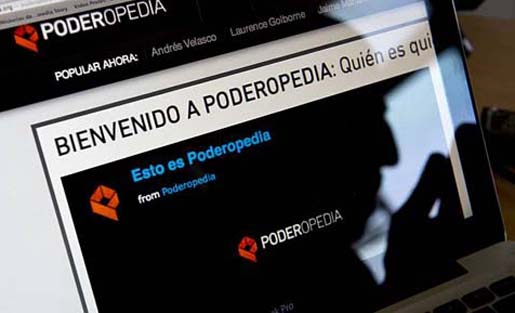The Poderopedia platform helps show the relationships among the elite in a country or region, especially in places where power is concentrated in the hands of a few people. After winning the Knight News Challenge in 2011, we launched Poderopedia in Chile last fall, with the goal of mapping who’s who in business and politics in our country. We also wanted to offer an open-source version of our platform that would let anyone map relationships in their own communities.
Since then, the platform has received a lot of international press coverage, and many Chilean news websites have used Poderopedia to do fact checking, background reporting, and discover newsworthy conflicts of interest with local politicians. They’ve also reused our content, thanks to our Creative Commons 3.0 license.
This week, as part of my ICFJ Knight International Journalism Fellowship, we took a giant step toward expanding the platform. We added several new features that let users republish, reuse and add to our content and code in an easy way.
Republish
All Poderopedia profiles now include the “Republish” option. By clicking “Republish,” the system displays a message explaining the conditions for reusing our content and the “Copy” profile button. This feature is an idea first released by ProPublica.org that we’re now reusing, including their metrics tracker called Pixel Ping. (You can check it out here.)
We encourage you to use our content and post it on your news website (as local news website Publimetro started doing with its presidential elections site), blog or personal website for free, as long as you follow the basic rules of attribution: Quote Poderopedia as the author and include a link from your website to the original content.
News River
As the name implies, each Poderopedia profile now has a tab called “News River.” When you click on this, you’ll see a list of the latest news where the entity is mentioned, including the name of the media source, the title, and the date of publication. This feature is still in its testing phase. Please give us your opinion of it by using the Feedback tab, available at the right side of your screen in Poderopedia’s website.
Update this
Do you think the information on a given Poderopedia profile is out of date? Click on our new “Needs updating” link to suggest new information we should add to the profile of an entity.
Our first API
If you are a programmer, this announcement is for you. We have rolled out the first version of Poderopedia’s API (application programming interface). We’re interested in hearing feedback from developers who use it. The Poderopedia API allows you to generate maps of connections from the D3.js library using the Poderopedia database of entities and connections. It also lets you make general searches and queries from the Poderopedia database of existing entities. To use the Poderopedia API, you must get an API Key. Request it by writing to us here: [email protected]
A growing community
This week, Poderopedia reached 1,600 registered users. The number of visitors to the platform and the amount of uploaded content are equally growing. We are grateful to our growing community dedicated to making information and power available to everyone.
Vote for us in the Data Journalism Awards
Finally, remember that Poderopedia is a finalist in the GEN Data Journalism Awards, and we want to rock the Public’s Choice Award. We’re currently in second place of the overall voting. By casting your vote here, you can help us beat the giants of global journalism.
Miguel Paz is a Chilean journalist and founder of Poderomedia foundation and Poderopedia; Knight News Challenge and StartupChile winner ProfUDP.cl; former deputy director @elmostrador and eternal muckraker. His work has been published in two books about the best Chilean investigative journalism.
The post originally appeared on the The International Journalists’ Network’s site, IJNet.org. IJNet helps professional, citizen and aspiring journalists find training, improve their skills and make connections. IJNet
is produced by the International Center for Journalists in seven languages — Arabic, Chinese, English, Persian, Portuguese, Russian and Spanish — with a global team of professional editors. Subscribe to IJNet’s free, weekly newsletter. You can also follow IJNet on Twitter or like IJNet on Facebook.

